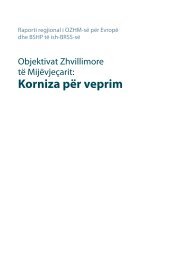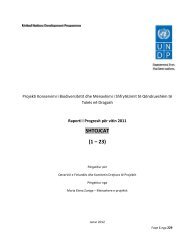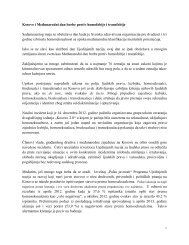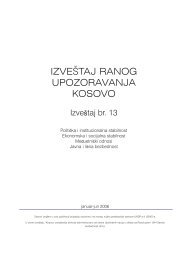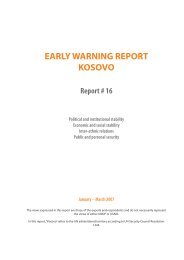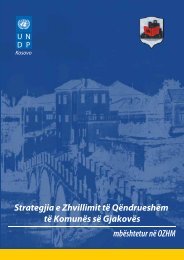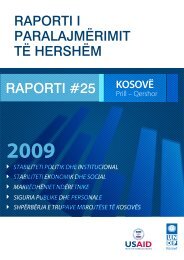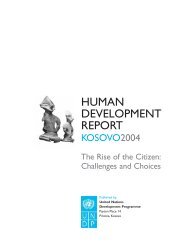Kosovo Human Development Report 2010 - UNDP Kosovo - United ...
Kosovo Human Development Report 2010 - UNDP Kosovo - United ...
Kosovo Human Development Report 2010 - UNDP Kosovo - United ...
You also want an ePaper? Increase the reach of your titles
YUMPU automatically turns print PDFs into web optimized ePapers that Google loves.
lenges. In particular, conditions<br />
for <strong>Kosovo</strong>-RAE are closer to those<br />
found in the least developed countries.<br />
The level of unemployment<br />
for RAE communities, where 75<br />
percent of male youth aged 15-24<br />
are unemployed, for example, is<br />
much higher than the <strong>Kosovo</strong> average.<br />
8 Discrimination also severely<br />
limits the contribution of Kosovan<br />
women – most clearly in the economic<br />
sector – and <strong>Kosovo</strong>’s disabled,<br />
many of whom are largely<br />
excluded from participation in normal<br />
life.<br />
These challenges are, to a greater<br />
or lesser degree, by-products of a single<br />
causative factor: social exclusion.<br />
In simple terms, this means denying<br />
certain groups their right to contribute<br />
economically, politically and socially<br />
to their society - thereby limiting the<br />
full potential of that society. Exclusion<br />
can happen deliberately, through institutional<br />
discrimination, or inadvertently,<br />
through cultural practices that<br />
in effect restrict individual rights and<br />
liberties. Whatever its cause, the effect<br />
is always the same - a self-limiting and<br />
unequal development process.<br />
Social exclusion as a concept (and<br />
its counterpart, social inclusion), is<br />
deeply connected to the human development<br />
process. It is also becoming<br />
a core philosophy of the European<br />
family. In 2000 at a landmark meeting<br />
in Lisbon, European Union leaders<br />
agreed to establish a Union-wide Social<br />
Inclusion Process, to co-ordinate their<br />
policies for combating poverty and social<br />
exclusion, and to prepare National<br />
Action Plans (NAP) against poverty and<br />
social exclusion. This recognized the<br />
essential interlinkages between under-development<br />
and social exclusion,<br />
and - more importantly - stressed the<br />
primacy of open, equal societies over<br />
more traditional economic indicators<br />
of national well-being such as GDP or<br />
Gross National Income (GNI).<br />
To understand where <strong>Kosovo</strong> is<br />
headed on its road to statehood, it is<br />
therefore more pertinent to ask where<br />
its society going, and what key factors<br />
will affect <strong>Kosovo</strong>’s social trajectory. Ultimately,<br />
it is the health and cohesion<br />
of its society that may prove the decisive<br />
factor in <strong>Kosovo</strong>’s EU ambitions.<br />
2. Understanding social exclusion:<br />
<strong>Kosovo</strong> <strong>Human</strong> <strong>Development</strong> <strong>Report</strong><br />
<strong>2010</strong><br />
The <strong>Kosovo</strong> <strong>Human</strong> <strong>Development</strong><br />
<strong>Report</strong> <strong>2010</strong> examines traditional socio-economic<br />
indicators, from poverty<br />
and unemployment to health and education,<br />
from the perspective of social<br />
inclusion. It highlights how discrimination<br />
- deliberate or otherwise - affects<br />
<strong>Kosovo</strong>’s socio-economic balance, its<br />
political process and its EU-orientated<br />
policy goals. Finally, it offers some recommendations<br />
on how the move towards<br />
a more inclusive society might<br />
be managed, as a fundamental precursor<br />
to economic and political progress.<br />
The report takes the EU approach to<br />
social inclusion as its conceptual basis.<br />
The EU has defined social inclusion as “a<br />
process which ensures that those at risk<br />
of poverty and social exclusion gain the<br />
opportunities and resources necessary<br />
to participate fully in economic, social<br />
and cultural life and to enjoy a standard<br />
of living and well-being that is considered<br />
normal in the society in which<br />
they live.” 9 The process should ensure<br />
that excluded or marginalized groups<br />
have greater participation in decision<br />
making which affects their lives. 10<br />
This approach to social inclusion<br />
differs from a traditional, poverty-ori-<br />
INTRODUCTION<br />
| 19



